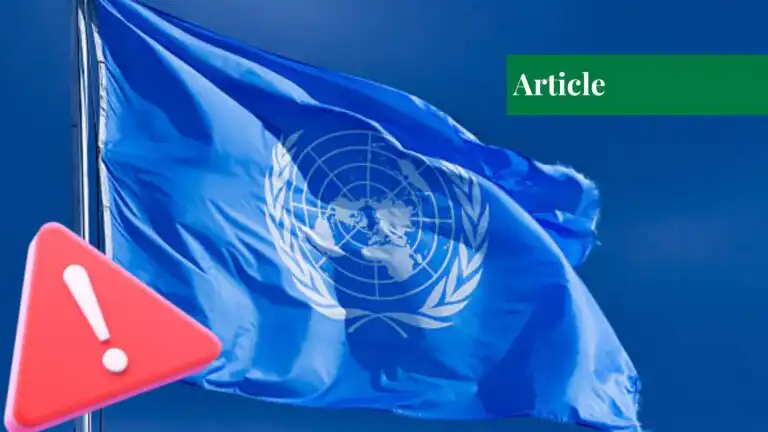Ever since the world experienced the horrific nature of the two world wars, the people became disillusioned and wanted nothing more than peace. Out of this desire came forth, first, the League of Nations and, secondly, the United Nations in 1945. It was founded using the lessons learned from the failure of President Wilson’s League of Nations. However, recently, many voices have been heard questioning the effectiveness of the UN in the wake of its failures and emerging conflicts like the Russia-Ukraine war and the Israel-Hamas conflict. People have started asking whether the UN has adhered to the principles it was founded upon or is going down the same path as the Wilsonian League of Nations.
Founding Principles of the United Nations (UN)
The principles upon which the UN was founded have been stated in its preamble, citing four main pillars:
- International Peace and Security
Out of the ruins of the two world wars, this became the primary reason for the foundation of the United Nations. The United Nations Security Council, or UNSC, is primarily responsible for worldwide peace and security.
- Human Rights
Perhaps the most significant development in the field of Human Rights in the last century was the Universal Declaration of Human Rights (UDHR) on 10 December 1948. It marked the first time in the international arena that the individual’s rights were expressed in such detail. This declaration also recognized the fundamental rights that every individual is entitled to by being human.
- Rule of Law
The rule of law is also one of the UN’s core principles. In a globalized world, treaties and agreements make the world economy function, and the UN provides a suitable environment for initiating such treaties and agreements.
- Development
The UN aims to promote social progress and better standards of living worldwide. The Economic and Social Council, or ECOSOC, is the organ associated with achieving this goal. The UN has initiated the United Nations International Children’s Emergency Fund (UNICEF), World Food Program (WFP), United Nations Framework Convention on Climate Change (UNFCCC), and similar initiatives to achieve development.
Successes of UN
- Peacekeeping Missions
United Nations has had considerable success in enforcing peace in several countries, such as:
- During the El Salvador Civil War (1991-1995), the UN appointed the United Nations Observer Mission in El Salvador (ONUSAL) to ensure the implementation of all agreements between the Government of El Salvador and Frente Farabundo Marti para la Liberacion Nacional, ending a decade long civil war.
- After Mozambique gained independence in 1975, it was embroiled in a long civil war between the Government and Mozambican National Resistance (RENAMO). After a peace agreement was negotiated in 1992, the UNSC established the United Nations Operation in Mozambique (ONUMOZ) to monitor and support a ceasefire and ensure a peaceful transition towards a democratic process.
- After Vietnam invaded Cambodia in 1978, it resulted in widespread destruction, famine, and factional warfare. The UNSC established the United Nations Advance Mission in Cambodia (UNAMIC) to maintain a ceasefire among warring parties. After the parties signed the Comprehensive Political Settlement of the Cambodia Conflict in 1991, the UN set up the United Nations Transitional Authority in Cambodia (UNTAC), which supervised disarmament, ceasefire, human rights, and conduct of free and fair elections.
- Namibia was a country under South African subjugation, and in 1989, the UN established the United Nations Transition Assistance Group (UNTAG), which supervised free elections, ensured a new Namibian constitution, and assisted in forming the new Namibian government.
- Assistance
United Nations World Food Program provides aid to approximately 69 million refugees who have fled their countries for different reasons. Moreover, the UN provides vaccines for nearly 45% of children around the globe.
- Decolonization
After the Second World War, the different colonies worldwide attained their independence. Moreover, the United Nations General Assembly o(NGA )passed a number of resolutions in support of decolonization efforts, such as the Declaration on the Granting of Independence to Colonial Countries and Peoples.
- Arms Control
Scarred from the horrific effects of the nuclear bombs dropped on Hiroshima and Nagasaki, Japan, on August 6 and 9, 1945, respectively, the UNGA passed several resolutions in support of arms control, especially relating to nuclear weapons and their development. The result of resolutions passed by the UNGA and discussions held in the UNSC came in the form of the NPT or Non-Proliferation Treaty, which entered into force on March 5, 1970, after ratification from the Soviet Union, United States, United Kingdom, and 40 other signatories. It was hailed as a successful endeavour by the UN to restrain the United States and Russia during the Cold War.
Failures of UN
- Inability to Resolve Long-Standing Disputes
The UN has unsuccessfully solved some long-standing disputes between countries that threaten regional stability and security. One glaring example of this is the Kashmir dispute between India and Pakistan. The UN has established the United Nations Military Observer Group for India and Pakistan, or UNMOGIP, to report on violations of ceasefire from both sides and in an attempt to resolve this conflict, the UNSC passed a resolution called UNSCR 47 that called for a transparent plebiscite to be held in Kashmir. However, due to the lack of enforcement mechanisms, this seven-decade-long dispute has stood as a monument to the UN’s failure.
- Failure to Uphold Humanitarian Law
Despite being a foundational pillar, the UN has been unable to fulfil its principle in instances such as the recent Israeli genocide of more than 46,000 Palestinians. Another instance of the UN’s failure to uphold humanitarian law is the Rwandan massacre of more than 800,000 innocents.
- Failure to Stop Wars
The maintenance of peace and stability is primarily the function of the UNSC, but the inherent flaw of the Security Council, the Veto Power, inhibits the UN’s ability to stop wars. The power of the infamous Veto grants the victor states of WW-II, aka the five permanent member states—the United States, Russia, China, United Kingdom, and France—the power to block any non-procedural decision. Evidence of this is the ongoing Russia-Ukraine war, where any attempt to pass a resolution to stop Russia is vetoed by Russia herself. Similarly, the UNSC failed to stop the rampant Israeli genocide of Palestinians, as any resolution aimed at Israel was rejected by Israel’s staunchest ally, the United States.
Analysis
The UN system has been controversial and criticised since its inception. Founded on seemingly altruistic principles, we must give credit where it’s due. The United Nations has achieved success. Ranging from human rights and social development of the individual of the world to the affairs of the state, conducting peacekeeping missions to contain and extinguish the flames of conflict and providing a platform for the superpowers of the world to agree upon nuclear arms control in the form of NPT and PTBT, the United Nations has done more what its predecessor could have ever accomplished.
However, it is not to say that all is sunshine and rainbows. Failures of the UN also stand glaringly in our faces, with consequences laid bare for all to see. For example, the Rwandan massacre and the inability of the United Nations to intervene in a humanitarian crisis raised several questions about the effectiveness of the UN. Similarly, the Iraqi Oil-for-Food program that the United Nations initiated was marred in controversy from the beginning and later was found to be the hotbed of corruption for the higher-ups of the UN, further undermining the United Nations and its credibility.
However, this further aggravates the need for an overarching authority to oversee the international system and restrain the anarchy present in the global order, as posited by the realists. The United Nations is the closest the world has ever been to an agreement on an overseeing authority, no matter how powerless. The failures of the UN necessitate structural reforms to ensure that the United Nations can uphold the very principles it was founded on.
Conclusion
The UN was founded to uphold humanitarian law, maintain peace and stability, ensure the rule of law in the international arena, and initiate projects for the social and sustainable development of the world’s individuals. The UN has accomplished feats such as UDHR, UNICEF, and WFP for development and has conducted several peacekeeping missions to ensure peace but has also failed to uphold the same ideals in other parts of the world, such as Rwanda and Bosnia. It is high time for the international community to recognize the inefficiency of the UN and the need for immediate reforms required for the United Nations to ensure it remains an effective and necessary organization in the coming turbulent future and does not get buried under the sands of time.
If you want to submit your articles and/or research papers, please check the Submissions page.
The views and opinions expressed in this article/paper are the author’s own and do not necessarily reflect the editorial position of Paradigm Shift.
My name is Sultan Naseer Aziz and I have completed my bachelors in English from the University of Gujrat(UOG). I have a profound interest in International Relations and current affairs.






